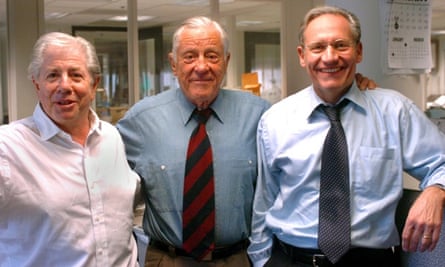Ben Bradlee, the former Washington Post editor who oversaw the reporting that brought down a president, united the worlds of journalism and politics in tribute on Tuesday after he died at the age of 93.
An editor of the paper for 26 years, during which time it won 17 Pulitzer prizes and doubled its circulation, Bradlee was remembered by colleagues and competitors as an icon of American journalism.
His stewardship of the Post’s investigation into the Watergate burglary – a scandal that directly led to the resignation of Richard Nixon – dominated responses to his death.
Barack Obama called him a “true newspaperman” who “told stories that needed to be told” and “transformed the Washington Post into one of the country’s finest newspapers”.
“For Benjamin Bradlee, journalism was more than a profession – it was a public good vital to our democracy,” said the president. “The standard he set – a standard for honest, objective, meticulous reporting – encouraged so many others to enter the profession.”
Bob Woodward and Carl Bernstein, the Post reporters who led the investigation, issued a joint statement that paid tribute to Bradlee’s “unbending” quest for truth and belief in the “necessity of that pursuit”.
“Ben was a true friend and genius leader in journalism,” they said. “He had the courage of an army. Ben had an intuitive understanding of the history of our profession, its formative impact on him and all of us. But he was utterly liberated from that. He was an original who charted his own course. We loved him deeply, and he will never be forgotten or replaced in our lives.”

Martin Baron, the Post’s current executive editor, said Bradlee “made an indelible mark on history and on our profession”.
Bradlee died at home in Washington – he had been ill for some time, according to his wife, Sally Quinn, who revealed in September that he was in hospice care after deteriorating health and a battle with Alzheimer’s disease for several years.
In 2013 he received the Medal of Freedom from Obama who said at the time “his passion for accuracy and unyielding pursuit of truth continue to set the standard for journalism”.
A low point of his editorship came in 1981 when the paper won a Pulitzer for a story about an eight-year-old heroin addict. The report turned out to have been fabricated by reporter Janet Cooke and the paper had to hand back the prize.
Bradlee remained close to the paper throughout its ups and downs, appearing in 2010 in a commercial for its iPad edition that played humorously on his legendary reputation.
In one of the first of many tributes published on Tuesday the New Yorker editor David Remnick described him as “funny and flashy but not a stuffed shirt”.
“Bradlee wasn’t Noam Chomsky,” he added. “He was not an outsider or a leftist. He was a cold war Democrat who probably voted for some Republicans. It helped that he had the good fortune that in a room full of schlubs he looked like a grandee.”
As the editor who steered the Washington Post’s history-making exposure of the Watergate presidential scandal, Bradlee became the most lauded and influential American journalist of his era.
Through months of indifference from rival media about what Richard Nixon described as a minor burglary at the Washington Democratic party offices in June 1972, Bradlee consistently supported Woodward and Bernstein in their original hunch that it would lead to the White House.
Just over two years later Nixon resigned and several aides were imprisoned.
Watergate made stars of the two reporters and thrust newspaper journalism into a heroic new mould. The episode became a successful 1976 Hollywood film, All the President’s Men, with Jason Robards playing Bradlee. The editor who transformed the Post from an undistinguished local sheet into an international name was now the pre-eminent example of how fearless pursuit of truth could still restore integrity by unseating its abusers, however powerful.
Bradlee was born in Boston into a distinguished family that went back three centuries in Massachusetts. After the war he obtained work with a New Hampshire newspaper but his break came in 1948 as a Washington Post reporter. He befriended the newspaper’s associate publisher, Phil Graham, who had intelligence connections.
In 1951 Graham found him a US embassy job in Paris and the next year he joined its propaganda unit. In 1953 he became a foreign correspondent for Newsweek, later owned by the Post. He returned to Washington with Newsweek, rejoined the Post and became editor in 1965.
In 1971 Bradlee followed the New York Times in publishing the Pentagon papers, the secret history of the US war in Vietnam disclosing unknown and embarrassing US involvements. The White House tried to stop the revelations but was overruled by the supreme court in Washington.
Bradlee wrote two books about his friend President John F Kennedy and his own autobiography, A Good Life, appeared in 1995.






Comments (…)
Sign in or create your Guardian account to join the discussion